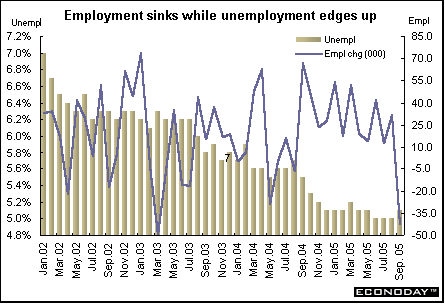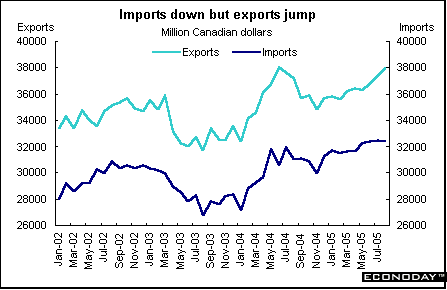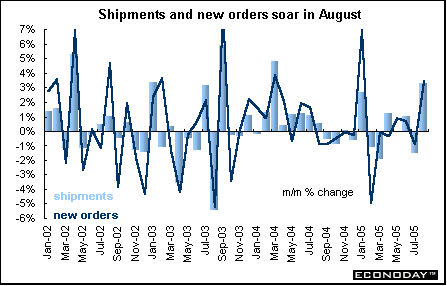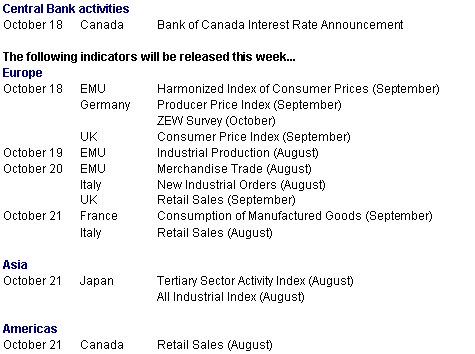Monday, October 17, 2005

Equities continued downward for the second week of the fourth quarter after recently registering new highs. The declines were attributed to expectations of higher U.S. interest rates after several Federal Reserve officials expressed their inflationary concerns along with uncertainly over the earnings outlook. Also contributing were the bankruptcy filing of U.S. auto parts supplier Delphi and the terrorist alert on the New York subway (which has been subsequently eased).
Financial markets worldwide have been more volatile of late. And since international investors follow the U.S. very closely, this turbulence may reflect some bewildering U.S. economic data. Last week, for example, the Institute of Supply Management survey of the U.S. manufacturing sector was much stronger than expected. But it was swiftly followed by a very weak survey of the services sector and a surprisingly resilient non-farm payrolls figure. Investors are clearly finding it difficult to decide whether strong economic data represent good news (because of the boost to corporate profits) or bad news (because it will keep the Fed raising interest rates).
Only Japanese stocks were up on the week, but they failed to offset the previous week's losses.
Global Stock Market Recap

Europe and Britain
Stocks were saved on Friday from a totally depressing week when London, Paris and Frankfurt equities were up thanks to a rather subdued reading in September U.S. core inflation (excluding food and energy) of 0.1 percent and despite the overall index's 1.2 percent leap. The FTSE had suffered its worst day of the year Thursday as investors worried about U.S. earnings and inflation. The 77 point drop was greater than the 71.3 decline after the July 7th terrorist attacks. The FTSE recovered on Friday, stimulated by the prospect of a Hilton hotel merger with its international counterpart after a 40-year divorce. But some analysts attributed two weeks of declines mostly to profit taking after the nearly 15 percent jump in the index since early May. The index has also been sensitive to crude oil price fluctuations given its heavy weighting of energy stocks such as BP and Shell. New leadership at Burberry took its toll on stocks as well.

The post-election deadlock between Germany's main two political parties - Christian Democrats and Social Democrats - was finally broken with Angela Merkel replacing Gerhard Schroeder as chancellor. But analysts caution that the prospects for reform look bleak, and investors did not celebrate the news as key ministerial posts were divided between the parties. The DAX, which had rallied strongly when the election was called, dropped as the outlook dims for substantive reforms particularly to the pension and health care system and for further deregulation of the labor market.
Asia/Pacific
Asian/Pacific stocks, except those in Japan, continued to tumble last week. Australian stocks were negatively impacted by falling commodity prices along with a good bit of profit taking after their heady third quarter climb. The all ordinaries index has lost 4.8 percent in the past two weeks. And despite Tuesday's 2.5 percent jump by the Nikkei, investors spent the rest of the week taking profits and eroding those gains. But thanks to Tuesday's mega gain, the Nikkei is down only 1.3 percent since the third quarter's end. The Hong Kong Hang Seng has given back 943 points or 6.6 percent in the past two weeks.

The Bank of Japan remained upbeat and continued to predict expansions in both domestic and external demand and a stabilization of prices before the end of the year. Its evaluation came after the Monetary Policy Board meeting that left policy unchanged. The BoJ kept its overnight interest rates at zero and will continue flooding the market with �30,000 billion to �35,000 billion of liquidity. At least two policy board members have argued at previous meetings for a lowering of liquidity targets which would signal the beginning of the end of the current quantitative easing framework established in March 2001.
At his press conference following the meeting, Toshihiko Fukui, BoJ governor, said it was important to get the timing right and reiterated the bank's position that it could not provide a numerical target for what would be considered sustainable price increases. The Bank does not have an inflation target. The bank is committed to keeping its current policy in place until prices stabilize at zero or above and a majority of the board thinks they will stay there.
Japan's parliament approved the sale of the nation's postal system, allowing Prime Minister Junichiro Koizumi to sell the world's largest savings bank and an insurance business with combined assets of $3.1 trillion. An August upper house rejection of the same proposal prompted Koizumi to call national elections. Koizumi won a landslide victory on September 11th and the legislation was resubmitted unchanged except for a six-month delay to October 2007 in the start of the sale process. The sale will take 10 years to complete. Koizumi has said he planned sale of Japan Post since he was minister of posts and telecommunications in 1992.
Currencies
Some analysts think that the dollar's fluctuations are dependent on investor focus. Sometimes investors hone in on cyclical developments but then at other times, they fret about the structural deficits - trade and fiscal. And recent hawkish Fed comments have brought investor focus back to interest rates and the spread between countries. If the dollar is the clearing price for U.S. borrowing and foreign lending, its value is determined in part by the willingness and ability of the rest of the world to increase claims on U.S. assets. The Fed estimates that since 1992 the proportion of savings flowing across international borders has increased five-fold, helping explain the sustainability of the U.S. deficit and the dollar.

The foreign exchange market was relatively quiet Monday as holidays in Japan, Canada and the U.S. limited trading activity during the day. The euro was down despite the news of a breakthrough after several weeks of political deadlock over the German chancellorship. And the euro remained under pressure amid concerns that key economic reforms could be diluted by the grand coalition and that Angela Merkel's appointment as chancellor did not mean an end to political uncertainty in Germany. The euro's weakness flew in the face of better-than-expected industrial production in France and strong export data from Germany. The yen strengthened modestly against the dollar helped by stronger-than-expected data on August machinery orders. On the week, the yen was down but the euro up against the dollar.
Indicator scoreboard
Germany - August seasonally adjusted merchandise trade surplus edged down to €12.7 billion from €13.5 billion in the previous month. Imports jumped 6 percent while exports were up 3.5 percent.

France - August seasonally adjusted industrial output was up 0.8 percent and 1 percent when compared with last year. Manufacturing output was up 0.7 percent and 0.9 percent on the year. All manufacturing categories were up with the exception of autos.

August seasonally adjusted merchandise trade deficit edged lower to €2.36 billion from €2.54 billion in July. Exports were up 4 percent led by gains in chemicals and pharmaceuticals while imports were up 3.1 percent thanks to crude hydrocarbon products.

Italy - August seasonally and workday adjusted industrial production excluding construction, the preferred Eurostat number, was up 1.3 percent and 1.6 percent when compared with last year. Consumer goods, investment goods and intermediate goods output were up on the month but energy goods output was down.

August merchandise trade deficit was €367 million after July's surplus of €2.389 million. Exports were down 0.4 percent while imports surged by 2.3 percent.

Britain - September producer output prices were up 0.7 percent and 3.3 percent when compared with the same month a year ago. Core output prices which exclude food, petroleum, beverages and tobacco prices were up 0.3 percent and 2.1 percent on the year. Output prices were boosted by higher gasoline and scrap steel prices. Input prices dropped 0.3 percent but were up 10.3 percent on the year. While crude oil prices were down 1.9 percent on the month, they soared 44.1 percent on the year.

September claimant count unemployment was up by 8,200 to 875,500, the highest level since March 2004. The claimant count unemployment rate remained at 2.8 percent for the fourth month. However, the number of unemployed calculated according to the International Labour Organization methodology was down 7,000 for the three ending in August. The ILO unemployment rate remained at 4.7 percent for the second month. ILO employment was up 28,759 for the latest three months and the employment rate remained at 74.8 percent.

Average earnings for the three month through August were up 4.2 percent when compared with the same three months a year ago. Excluding bonuses, average earnings were up 4 percent. Private earnings grew 4.1 percent while public sector earnings were up 4.3 percent. Manufacturing earnings were up 3.4 percent while service earnings were up 4.4 percent.

August global merchandise trade deficit soared to Stg5.621 billion from Stg5.521billion in July and set a new record. The total deficit for both goods and services jumped to Stg5.337 billion from Stg3.940 billion in July. The services surplus dropped to Stg284 million from Stg1.581 billion in July, the lowest surplus since May 1993. The reason for the drop was the impact of Hurricane Katrina which caused Lloyd's of London to record insurance claims totaling Stg1.4 billion in August. These claims were deducted from UK insurance exports. National Statistics said that the impact on the services balance would not impact the September data.

Asia
Japan - September corporate goods price index (CPGI) was up 0.2 percent and 1.7 percent when compared with the same month a year ago. Prices for petroleum and coal products including gasoline were up as were agricultural, forestry & fishery products. Prices for electrical machinery & equipment were down.

August industrial output was revised to 1.1 percent from the 1.2 percent gain originally reported. Shipments were revised upward to show a 2.2 percent increase rather than the originally reported 1.7 percent climb.

Australia - September employment sank by 42,300 jobs while the unemployment rate inched up to 5.1 percent from 5 percent in August. Full-time employment decreased by 25,900 while part-time employment declined by 16,500. The participation rate was 64.5 percent.

Americas
Canada - August merchandise trade surplus widened to C$5.57 billion ($4.75 billion) from C$4.89 billion in the previous month. Exports were up 1.5 percent thanks to natural gas, automobiles, and farm goods while imports were down 0.4 percent. With the exception of energy, all import categories were down on the month. Canada's surplus with the U.S. widened to C$8.89 billion from C$8.63 billion in July.

August factory shipments soared 3.3 percent and were up 1.6 percent when compared with the same month a year ago. Rising oil prices increased shipments of petroleum and coal 6.5 percent while auto shipments jumped by 11 percent as companies resumed production after summer shutdowns to deliver 2006 model cars to dealerships. Excluding motor vehicles, parts and accessories, shipments were up 2.3 percent. Sixteen of 21 manufacturing industries that make up 90 percent of total shipments reported increases in August. New orders advanced 3.4 percent and 3.6 percent on the year. Unfilled orders were up 1.9 percent and 12.1 percent on the year.

Bottom line
The week ahead is a light one on the indicator front. Of importance though, is the German ZEW expectations survey on Tuesday. The survey should reflect the decline in oil prices from their hurricane induced highs as well as reactions to the German election outcome. The continued uncertainty resulting from the indecisive outcome could depress respondents.
The Bank of Canada will make its interest rate decision known on Tuesday. The Bank is expected to increase their key interest rate by 25 basis points to 3 percent. Interest rates were increased to 2.75 percent on September 7th.
Looking Ahead: October 17 through October 21, 2005




